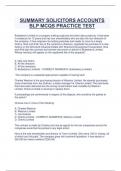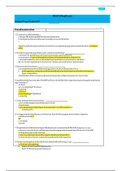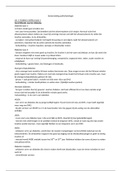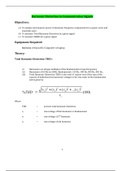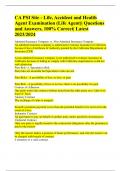Exam (elaborations)
Questions and detailed answers on BASIC INTEGRATION RULES
- Course
- Institution
- Book
Questions and detailed answers to help you stand out in basic integration rules, as it will improve your understanding very deep.
[Show more]Some examples from this set of practice questions
1.
Evaluate the integral of ∫(x^2 + 1) / (x^4 + 1) dx
Answer: **Solution:** We can use partial fraction decomposition to evaluate this integral. First, we factor the denominator `x^4 + 1` into `(x^2 + √2x + 1)(x^2 - √2x + 1)`. Then, we can write the integral as `∫(x^2 + 1) / (x^4 + 1) dx = ∫(A / (x^2 + √2x + 1)) + (B / (x^2 - √2x + 1)) dx`, where `A` and `B` are constants. Multiplying both sides by `(x^4 + 1)` and setting `x = -√2 - 1`, we get `A = (-√2 - 1)^2 + 1 = 4`. Similarly, setting `x = √2 - 1`, we get `B = (√2 - 1)^2 + 1 = 4`. Thus, the integral becomes `∫(4 / (x^2 + √2x + 1)) + (4 / (x^2 - √2x + 1)) dx`. We can evaluate this using the substitution `u = x^2 + √2x + 1` for the first term and `v = x^2 - √2x + 1` for the second term. The result is `4ln(x^2 + √2x + 1) / √2 - 4ln(x^2 - √2x + 1) / √2 + C`.
2.
What is pharmacology and its explained related topics
Answer: What Is Pharmacology? Pharmacology is the scientific study of the effects of drugs and chemicals on living organisms where a drug can be broadly defined as any chemical substance, natural or synthetic, which affects a biological system. Pharmacology may involve how organisms handle drugs, identification and validation of new targets for drug action, and the design and development of new drugs to prevent, treat and cure disease. Pharmacology research is also a critical component in the development of modern \\\'personalized medicine\\\'. There are many sub-specialties within the general discipline of pharmacology. Pharmacodynamics is the study of the effects of drugs on biological systems and specifically addresses the chemical properties and physiological and behavioral effects of drugs arising from their interaction with molecular targets such as receptor proteins or enzyme systems. In contrast, pharmacokinetics is the study of what biological systems do to the drug and encompasses investigations of drug absorption, distribution, biotransformation and excretion, essential information for the design of drug treatment schedules in different patient populations and experimental animals, and for the prediction of drug-drug interactions that may enhance or compromise the effectiveness and safety of t therapeutic agents. Pharmacologists require sound basic knowledge of physiology, biochemistry, cell biology and molecular biology upon which to build their specialized knowledge and experimental approaches for the investigation of novel aspects of drug action. Such studies may occur at various levels, including molecular interactions, cellular and subcellular signal transduction processes, tissue and organ regulation, as well as integrated physiological or behavioral responses in intact organisms. The knowledge acquired facilitates the development of new drugs and contributes to rational therapeutics that involves the safe and effective use of drugs for therapeutic benefit. Also, this interdisciplinary knowledge offers pharmacologists a unique perspective on a wide range of biomedical issues and enhances employment opportunities in many areas of scientific investigation. While pharmacologists are trained as laboratory researchers, pharmacists usually work in a hospital or retail pharmacy and are concerned with the preparation, dispensing, dosage, and the safe and effective use of therapeutic .
3.
1. Evaluate the integral: ∫(sin^3(x) * cos^2(x)) dx
Answer: Solution: We perform a substitution: Let u = sin(x), then du = cos(x) dx. We rewrite the given integral as: ∫(u^3 * (1 - u^2)) du Now, we perform polynomial multiplication: ∫(u^3 - u^5) du Integrate the polynomial term-by-term: ∫u^3 du - ∫u^5 du = (u^4/4) - (u^6/6) + C Since u = sin(x), we substitute back: (sin^4(x)/4) - (sin^6(x)/6) + C So, the final result is: (sin^4(x)/4) - (sin^6(x)/6) + C
4.
What is medical-surgical nursing and its detailed explanation of related topics
Answer: Medical-surgical nursing is a broad specialty area, which covers a wide range of topics related to the care of adult patients with medical or surgical conditions. Some of the major topics under medical-surgical nursing include: 1. Anatomy and physiology: Understanding the normal structure and function of organ systems and how they can be affected by disease or injury. 2. Pathophysiology: Understanding the underlying mechanisms of various medical and surgical conditions, including their causes, progression, and treatment options. 3. Pharmacology: Understanding the medications used to treat medical and surgical conditions, including their actions, side effects, and interactions with other drugs. 4. Nursing assessments: Conducting a comprehensive physical and psychological assessment of patients with medical or surgical conditions, including gathering health histories, conducting physical exams, and assessing mental and emotional states. 5. Patient education: Educating patients and their families about their medical or surgical conditions, including risk factors, signs and symptoms, treatment options, and self-care strategies. 6. Medical and surgical interventions: Administering medications, providing wound care, monitoring vital signs, managing pain, and assisting with various medical and surgical procedures. 7. Management of medical and surgical emergencies: Responding to medical and surgical emergencies, such as cardiac arrest, respiratory distress, and post-operative complications. 8. Patient safety: Implementing measures to ensure patient safety, including infection control protocols, fall prevention strategies, and medication administration practices. 9. Ethical considerations: Understanding ethical and legal issues related to medical-surgical nursing, such as informed consent, end-of-life care, and research ethics. 10. Care of patients with chronic illnesses: Offering support to patients with chronic conditions such as diabetes, hypertension, asthma, and heart failure. 11. Care of patients with acute illnesses: Managing patients with acute medical or surgical conditions such as pneumonia, sepsis, and trauma. 12. Gerontological nursing: Nursing care for older adults who often have multiple chronic illnesses, frailty, and complex care needs. 13. Care of patients with oncological conditions: Understanding the medical and surgical management of patients with cancer, chemotherapy, radiation therapy, and palliative care. 14. Care of patients with gastrointestinal disorders: Managing patients with gastrointestinal disorders, such as peptic ulcers, inflammatory bowel disease, and liver cirrhosis. 15. Care of patients with respiratory disorders: Understanding the management of respiratory illnesses such as asthma, chronic obstructive pulmonary disease (COPD), and pneumonia. 16. Transplant nursing: Understanding the nursing care for patients undergoing organ transplantation, including preoperative and postoperative care. 17. Neurological nursing: Understanding the nursing care for patients with neurological disorders, such as Alzheimer\\\'s disease, multiple sclerosis, and stroke. 18. Renal nursing: Understanding the nursing care for patients with renal disorders, such as acute kidney injury, chronic kidney disease, and dialysis. 19. Pain management: Providing nursing care for the management of acute and chronic pain in patients with medical or surgical conditions. 20. Infection prevention and control: Implementing measures to prevent the spread of infectious diseases in healthcare settings. 21. Endocrine nursing: Understanding nursing care for patients with endocrine disorders such as thyroid disorders, diabetes mellitus, and adrenal disorders. 22. Perioperative care: Understanding nursing care for patients undergoing surgical procedures, including preoperative preparation, intraoperative monitoring, and postoperative recovery. 23. Cardiac nursing: Understanding nursing care for patients with cardiac disorders, such as heart failure, angina, and arrhythmias. 24. Wound care management: Understanding the management of wounds, including basic wound care, pressure ulcers, and surgical site infections. 25. Palliative and hospice care: Understanding nursing care for patients undergoing end-of-life care, including managing symptoms, providing emotional support, and ensuring quality of life. Overall, medical-surgical nursing is an exciting and dynamic specialty area that requires nurses to have a broad range of knowledge and clinical skills. Medical-surgical nurses work in various settings, including hospitals, clinics, nursing homes, and home healthcare agencies, and play a critical role in the care of patients with medical or surgical conditions.
5.
How to solve complex statistics problems
Answer: Solving complex statistics problems involves several steps, including: 1. Understand the problem statement: Read the question carefully and make sure you understand what is being asked. 2. Identify the relevant statistical concepts: Figure out which statistical concepts related to the problem and are required to solve it. 3. Collect and organize data: Obtain the necessary data and ensure it is properly organized. 4. Choose an appropriate statistical test: Determine which statistical test is appropriate for the problem at hand. 5. Calculate the results: Use the appropriate statistical method to calculate the results. 6. Interpret the results: Analyze the results and determine what they mean in the context of the problem. 7. Verify the results: Cross-check your calculations and ensure they are accurate. 8. Communicate the results: Present your findings in a clear and concise manner. It is important to have a good understanding of statistics, including mathematical concepts and statistical software programs such as R or Python. Additionally, problem-solving skills and critical thinking are crucial to solving complex statistical problems.

Stuvia customers have reviewed more than 700,000 summaries. This how you know that you are buying the best documents.

You can quickly pay through credit card or Stuvia-credit for the summaries. There is no membership needed.

Your fellow students write the study notes themselves, which is why the documents are always reliable and up-to-date. This ensures you quickly get to the core!
You get a PDF, available immediately after your purchase. The purchased document is accessible anytime, anywhere and indefinitely through your profile.
Our satisfaction guarantee ensures that you always find a study document that suits you well. You fill out a form, and our customer service team takes care of the rest.
Stuvia is a marketplace, so you are not buying this document from us, but from seller goodthoughtsqweku. Stuvia facilitates payment to the seller.
No, you only buy these notes for $22.99. You're not tied to anything after your purchase.
4.6 stars on Google & Trustpilot (+1000 reviews)
86633 documents were sold in the last 30 days
Founded in 2010, the go-to place to buy study notes for 14 years now
